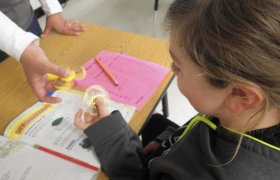Types of Parenting: How to be an Effective Parent and Friend

How many times have we all heard the old banality: “be your child’s parent, not their friend”? Recent studies would suggest that even once is too many. There’s a misguided notion out there that parenting is somehow a binary activity: you are a friend or a parent.
You subscribe to “free range” or helicopter-parenting. You are failing or succeeding to raise them successfully. Whoever created this oddly narrow ideology concerning our relationships to our children might not have had modern statistics at their disposal. The concept of nuanced parenting is not a new phenomenon but decades of studies now have the gathered evidence to suggest that not approaching parenting with some level of balanced discretion is actually harmful to a child’s feelings of self-worth and overall success.
The Umbrella Terms
Of course there are varying shades of success all across the parenting spectrum. But most broadly, the psychological and sociological communities have divided trending choices into three specific parenting styles: Authoritarian, Permissive, and Authoritative.
Authoritarian

On one extreme side of the scale, we have Authoritarianism. If you studied governing styles at all in school, you probably have a pretty solid understanding of what this constitutes.
Authoritarian parents tend to expect strict obedience from their children. In an Authoritarian household, the parents’ rule is law and it is not to be questioned nor is there to be deviation from it. “Because I said so,” is a common response to young inquiries.
(Note that this is different than when your toddler asks why they have to wear pants to the store, and you offer every possible patient explanation under the sun before resulting to “because I said so” out of a sheer exhaustion of creativity.)
People who abuse the old “parent not friend” proverb fall mostly into this class. Authoritarian parents tend to be described by their offspring as emotionally distant, and/or highly involved to the point of helicopter parenting, though of course there are exceptions to this.
Permissive

At the opposing end of the spectrum lies the Permissive Parent. Where the Authoritarian sets boundaries that are perhaps too unyielding to form a healthy bond with their child, the Permissive Parent has very few or else very flimsy boundaries in place. This is the parent that perhaps fails to see how one can be a peer while still implementing discipline.
Warmth and responsiveness are incredible facets to have in your relationship with your child, but applied too liberally and too often, they create an environment in which the child has no sense of guidance or structure in place. Permissive Parents tend to yield to their child’s wishes quickly, possibly out of fear of becoming “the bad guy.”
(It’s alright if your kid doesn’t always like you. Sometimes sacrificing them liking you for the moment is the greater act of love if you’re doing what is healthiest for them. Eventually they’ll grow to see that.) The opposite of the helicopter parent (sometimes called the free range parent), this group largely means well, just like their counterpart, but pose their own dangers, including downright neglect at the extreme end of the scale.
Authoritative

This brings us to the happy compromise recommended by most experts in child development: the Authoritative Parent. Neither too stringent nor too passive, an Authoritative style of parenting strikes a healthy balance in the Friend vs. Parent debate.
Authoritative parenting would suggest that you can enforce rules that help guide your child towards the right decisions while still allowing them autonomy and freedom to express themselves and make mistakes. A key part of this philosophy is perhaps its unique way in handling failure. When presented with their child’s failing, an Authoritarian parent is inclined to punish and/or shame, while a Permissive Parent will most likely coddle (with a negligent parent downright ignoring their child’s struggle and needs). Alternately, an Authoritative Parent looks at failure as an important and necessary part of the growing process and expresses as much to their child. They might utilize missteps to help discuss what more effective choices could have been made, but they never approach the subject in such a way that would either ridicule their child or leave them with no concept of personal responsibility in the matter.
Backing it Up
All of these concepts might seem intangible and speculative until you look at the vast amount of research that has been conducted over the past few decades. There are plenty of scholarly articles and studies out there to back up the theory that a balanced, authoritative approach to parenting yields the best results in child development and overall achievement. Essentially–yes, experts want you to be their friend as well as their parent. Statistics will back you up on that.
Authoritative Parenting, Psychosocial Maturity, and Academic Success among Adolescents: Steinberg, Elman and Mounts (1989)
Which parenting styles inspire the best results in youth is hardly a new debate. In the December 1989 issue of Child Development, Laurence Steinberg, Julie Elman, and Nina S. Mounts collected data suggesting that Authoritative Parenting had the most positive effects on both academic and personal growth in adolescents.
This study, backed by the Society for Research in Child Development, proposed that Authoritative Parenting facilitates academic achievement, rather than simply accessorizing it. Chiefly, Steinberg, Elman, and Mounts looked at the correlation between three aspects of Authoritative Parenting (acceptance, psychological autonomy, and behavioral control) and scholastic success. They also considered the maturity and social skills of the control group. Their conclusion was that adolescents (aged 10-16) that described their parents as affectionate, democratic, and resolute in their boundaries, all developed healthy attitudes about their abilities and performance, and thus tended to exceed the results of their peers.
Authoritarian Attitudes as a Risk for Conduct Problems: Thompson, Hollis, and Richards (2003)
In a study concentrated more specifically on the negative consequences of Authoritarian child-rearing practices, Ann Thompson, Chris Hollis, and Dr. David Richards linked maternal authoritarian outlooks with behavioral issues in children aged 5, and aged 10.
The study claims to have been engineered in such a way as to be free of socio-economic influence or the added variable of a mother’s own psychological distress. The data was gathered from questionnaires distributed and then behavior monitored across a large group in the 1970 British Cohort Study. Thompson, Hollis, and Richards purport in the April issue of European Child & Adolescent Psychiatry that the link between authoritarian ideals and children exhibiting behavioral issues is linear and statistically fortified.
Walking the Line: the Balancing Act

It may feel at times that there is a fine line between these three parenting methods. Boundaries shift depending on age, maturity, and a multitude of outside circumstances. There is an often uncomfortable dichotomy at play. When your child is young, they require firm boundaries and constant supervision to keep them from harming themselves or others, and to instill in them cultural and behavioral rules–and yet affection must also be abundantly available to little ones, who still seek a sense of approval and belonging. At what age does that change? When is it safe to step back and let them make mistakes?
There’s no easy answer to that: all children grow at different rates in different areas of development. What’s important is that your child always feels as if they can come to you honestly for guidance and support. Create a safe environment in which they can test their limits and beliefs, and sometimes fail. Communicate with them openly, and remember that they are autonomous individuals, who will both agree and disagree with you and your opinions.
Put boundaries in place that serve to teach your child principles, while allowing them to explore what that might mean to them. Children who feel that their parents will reject them for mistakes tend to try to cover them up, or else make them pointedly as a means of rebellion. If your child finds themselves in trouble, who do you want them to look to for assistance? If the answer is yourself, make sure to facilitate a relationship in which that feels like an accessible option to them.
Your friendship with your child will be different than their relationship to their peers; embrace this. You won’t always be the individual that they pal around with or try to impress, but that’s not what you’re there for. You are the individual that they will turn to when they need a sense of direction, which is a different, more reverent kind of trust, and one that you should treat with the proper care and respect.
We all hear that it happens in the blink of an eye, which is an adage without evidence to the contrary, so enjoy it. You might learn just as much from them as they learn from you.






